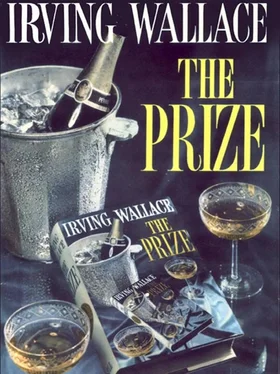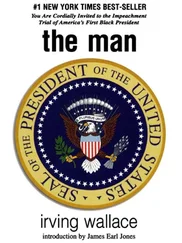Garrett decided that he owed her the courtesy of conversation. ‘Are we almost there?’ was all that he could muster up to ask.
‘Any minute,’ said Ingrid Påhl. She held a lighter to her cigarette, and now exhaled a stream of smoke. ‘I have only seen the hospital twice myself. And my knowledge of medicine is limited to patented treatments of heartburn, upset stomach, and constipation. Lest you think it is odd that I-scientifically, the least qualified member of the reception committee-was assigned to escort you this morning, I had better explain.’
‘As a Nobel Prize winner yourself, I can think of no one more qualified,’ said Garrett with heavy gallantry.
‘You are a gentleman, Dr. Garrett, but it is no use flattering me.’ Her obese presence exuded cheer. ‘I am not a fit companion for you. I do not even know where the human kidney is located. And as to the heart, I never remember-is it on the right or the left?’
‘Left.’
‘There you are. The truth is, Dr. Krantz was to have been your escort this morning. You could have talked to him. I daresay he is a grouch, but a brilliant one. Unfortunately, for you, Dr. Krantz had to rush off to the Bromma Airport to receive an old friend and distinguished visitor from East Berlin.’
‘East Berlin? Are they allowed out?’
‘Of course, Dr. Garrett. Do not believe everything you read. Most Germans-while I do not have excessive affection for them-do not live and work there by choice. I have no idea about Dr. Krantz’s friend, but, at any rate, it was someone who had to be met personally. So the honour of taking you to the Caroline Institute fell upon me. I hope you are not too disappointed.’
‘Miss Påhl, I’ve told you-’
‘Actually, I suppose I do know a little about the Caroline Institute. Some years ago, an English periodical inquired if I would write a series of articles about Sweden. Journalism is not my cup of tea, but I needed the money, and I considered the offer. The first article was to be on the Caroline Institute, since it has some reputation as the source of the Nobel medical award. I did a week or two of preliminary research-took a tour of the hospitals, renewed acquaintance with their Nobel committee-men, asked questions, made notes-but when it came down to it, I could not write the article. Some writers are simply no good with facts, and I am one of them. Facts are like figures with me; they baffle me entirely. I never wrote the article, but I did not starve, either. A Swedish film company bought one of my old novels, and I was saved to write again, to the dismay of a majority of my critics. Anyway, all I have left of the experience are some unorganized facts about the Institute. You may have them as a gift, if you are interested.’
‘I certainly am interested,’ said Garrett, trying to hide his restlessness, for he wanted to be where he was going and get on with Öhman and begin the march against the enemy.
‘Fact one,’ said Ingrid Påhl. ‘The Caroline Institute was started in 1810, to supply military surgeons for the Swedish army, which was having one of its periodic wars with Denmark and Russia. Fact two. Alfred Nobel was fascinated by medicine. On different occasions, he had friends make blood transfusion and urine experiments under his guidance. It was natural that he would give a prize in medicine, and select the respected Caroline Institute to confer it. Fact three. The Caroline committee had to determine what Nobel had in mind when he wrote in his will that he wished “the most important discovery” in medicine or physiology honoured. Did he want to reward practical advances only? Or theoretical progress as well? The Caroline committee decided to reward both types of discovery. And they did not limit their prizes to doctors. Through the years, they also honoured biologists, chemists, zoologists, and once a biophysicist. Fact four. Nominations for the award that you won come from professors within the Caroline Institute, from members of the Swedish Academy of Science, from former Nobel medical winners, from faculties of all major universities in Scandinavia, and from faculties of outstanding universities in twenty foreign countries. There are about one thousand persons eligible to make nominations. Should I go on?’
‘Please,’ said Garrett, who involuntarily found himself absorbed.
Ingrid Påhl ejected her cigarette butt into the ash tray. ‘Fact five. There are three permanent members on the Nobel medical committee who advise and recommend. Usually, temporary members, experts in this or that, are added to the committee from the Caroline teaching body. The medical winners are elected each year in the session room on the ground floor of the Caroline Institute. It is a light airy room, with the longest modern table you have ever seen, and modern Swedish chairs for the judges. As I recall, there are sixteen or eighteen oil portraits of eminent Swedish physicians and Nobel personnel on the walls and two white marble statues between the windows. The final vote is made by forty-five physicians and instructors on the Caroline staff.’
The car slowed, and Ingrid Påhl gestured with her head. ‘And lo, there it is now-the Caroline Institute.’
The Saab turned off the main thoroughfare, and drove through a gate and across a private road that wound through a landscape of icy trim lawns, clipped hedges, and many clusters of aged trees. Again, the Saab slowed, and wheeled left through an opening between two rows of frozen foliage.
The car drew to a stop on a paved site. The young driver tumbled quickly out of the front, trotted around, and opened the rear door. With some difficulty, fighting gravity and density, he freed Ingrid Påhl from her place and helped her out of the sedan. Then he gave Garrett a hand.
Before them stretched a squat three-storey oblong building of red brick. Its rows of windows peered down at them like a montage of square eyes. Three cement stairs led to two heavy doors, and above the entrance were projected letters that read, MEDICINSKA NOBELINSTITUTET. Garrett glanced off to his right. A bench rested in the open, on the pavement, before a miniature park of withered plants and barren trees. Behind the bench, on a high stone pedestal, stood a weather-beaten black bronze bust of Alfred Nobel. There were touches of frost around Nobel’s eyes and his set mouth.
Garrett brought his overcoat collar around his neck.
‘You would not believe how lovely this is in the summer,’ said Ingrid Påhl. ‘Now it is impossible. Either we build a fire, or we go inside.’
The two of them hurried inside.
Dr. Erik Öhman, sitting with one knee propped up against his desk, a cigar between his teeth, was scanning a newspaper held wide open. The moment that Öhman saw them, he leaped to his feet, almost upending the chair, and pounded around the desk. Ignoring Ingrid Påhl’s formal introduction, he grabbed Garrett’s hand and pumped it with unrestrained enthusiasm.
‘Dr. Garrett,’ he said, ‘Dr. Garrett-what a pleasure this is for me. How I have looked forward to it-’
Somewhat taken aback, for he was not a demonstrative man, and (despite the prize) he had never valued himself highly in his secret heart, Dr. Garrett tried to return his host’s ardent and worshipful greeting. ‘Believe me, it’s good to meet you at last, Dr. Öhman.’
‘Sit down, both of you-please sit down,’ said Öhman, herding them to the chairs. ‘There will be hot coffee in a moment.’ He looked at Garrett with bright eyes of disbelief, as lowly subject to his sovereign. He tried to speak, but no sound came forth except a drawn-out rumble, which Garrett would learn was a speech impediment. ‘Uhhh,’ was the embryonic sound seeking the birth of vocabulary, ‘uhhh-Dr. Garrett, I am so privileged.’ He ran behind his desk, and brought forth the chair, so that he could sit directly opposite Garrett and Ingrid Påhl.
Читать дальше












